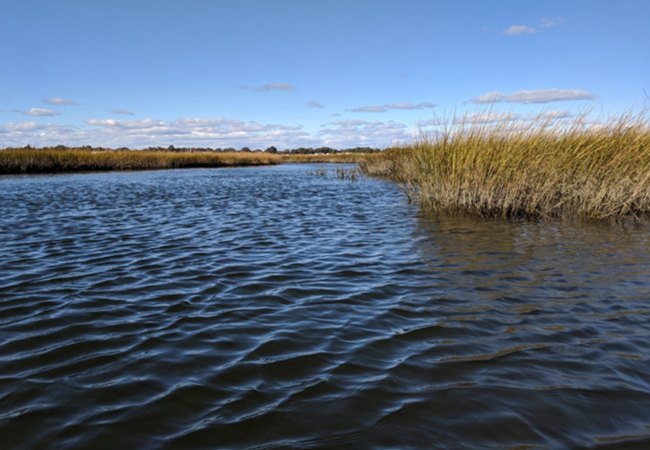
Coastal marsh, one of the types of habitats for which future conservation needs were discussed during the NYSG-LISS Coastal Habitat Priorities virtual meeting. Credit: Maria Tzortziou/CUNY
Contact:
Jimena Perez-Viscasillas, NYSG Long Island Sound Study Outreach Coordinator, E: jbp255@cornell.edu, P: (631) 632-8730
New York Sea Grant and partners gathered experts from New York and Connecticut to inform Long Island Sound watershed conservation action planning for the next five years
Stony Brook, NY, March 8, 2021 - Given Long Island Sound’s size, its economic and ecological importance, and its status as a bi-state estuary, effective dialogue and collaboration between experts is essential to properly conserve it.
In 2003 and 2014, the Long Island Sound Study (LISS) national estuary program held workshops that brought together coastal habitat researchers and environmental management professionals from across the LIS watershed for a series of talks, discussions, and panels. These workshops enabled conversations about recent projects in support of a more informed and unified conservation effort. Discussions at these events helped inform LISS’s Comprehensive Conservation and Management Plan (CCMP), which guides conservation work in the LIS.
When the pandemic caused indefinite postponement of the 2020 next in-person workshop that was to guide revisions to the newest edition of the CCMP, New York Sea Grant and LISS partners organized a virtual meeting with local coastal habitat experts. The main goal of this virtual gathering was to facilitate discussions on potential priority ecosystem needs. Collecting information on the participants’ most recent projects also served to better understand the panorama of work in the watershed.
This Coastal Habitat Priorities meeting in 2020 was incredibly valuable to LISS for incorporating participants’ insights into actions that will drive coastal habitat conservation for the next five years. This event was also essential to facilitating dialogue between local experts to shape effective management practices for the LIS watershed.
More Info: New York Sea Grant
New York Sea Grant (NYSG), a cooperative program of Cornell University
and the State University of New York (SUNY), is one of 34 university-based
programs under the National Oceanic and Atmospheric Administration’s
National Sea Grant College Program.
Since 1971, NYSG has represented a statewide network of integrated
research, education and extension services promoting coastal community
economic vitality, environmental sustainability and citizen awareness
and understanding about the State’s marine and Great Lakes resources.
Through NYSG’s efforts, the combined talents of university scientists
and extension specialists help develop and transfer science-based
information to many coastal user groups—businesses and industries,
federal, state and local government decision-makers and agency managers,
educators, the media and the interested public.
The program maintains Great Lakes offices at Cornell University, SUNY
Buffalo, SUNY Oswego and the Wayne County Cooperative Extension office
in Newark. In the State's marine waters, NYSG has offices at Stony Brook
University in Long Island, Brooklyn College and Cornell Cooperative
Extension in NYC and Elmsford and Kingston in the Hudson Valley.
For updates on Sea Grant activities: www.nyseagrant.org has RSS, Facebook, Twitter, Instagram, and YouTube links. NYSG offers a free e-list sign up via www.nyseagrant.org/nycoastlines for its flagship publication, NY Coastlines/Currents, which is published quarterly.